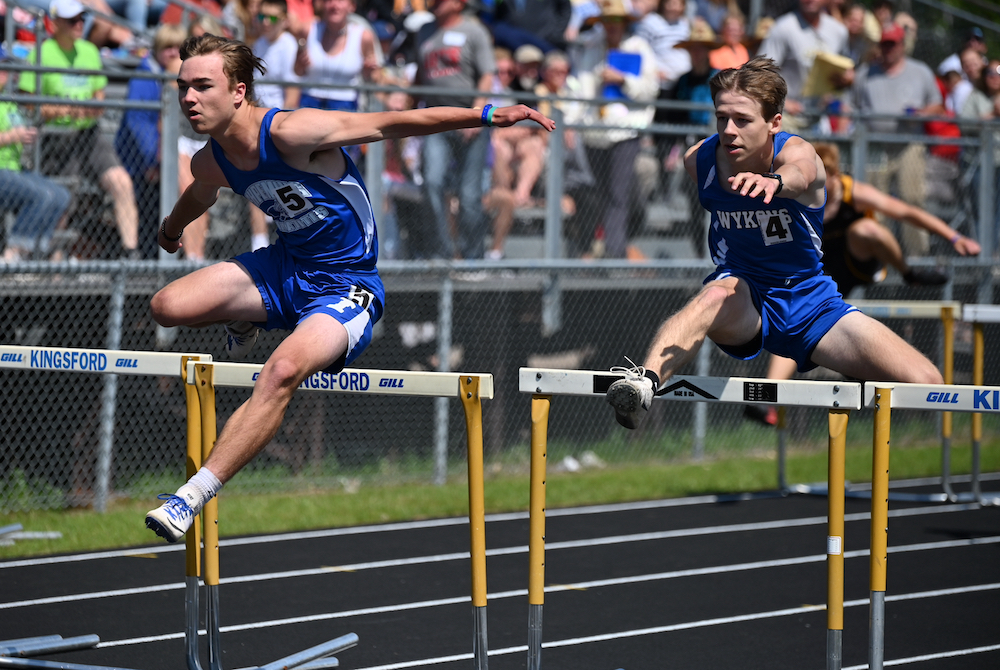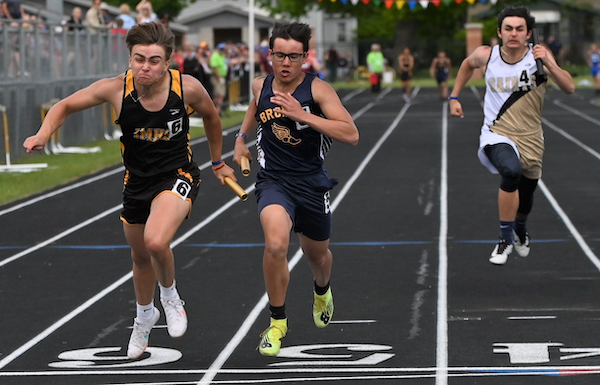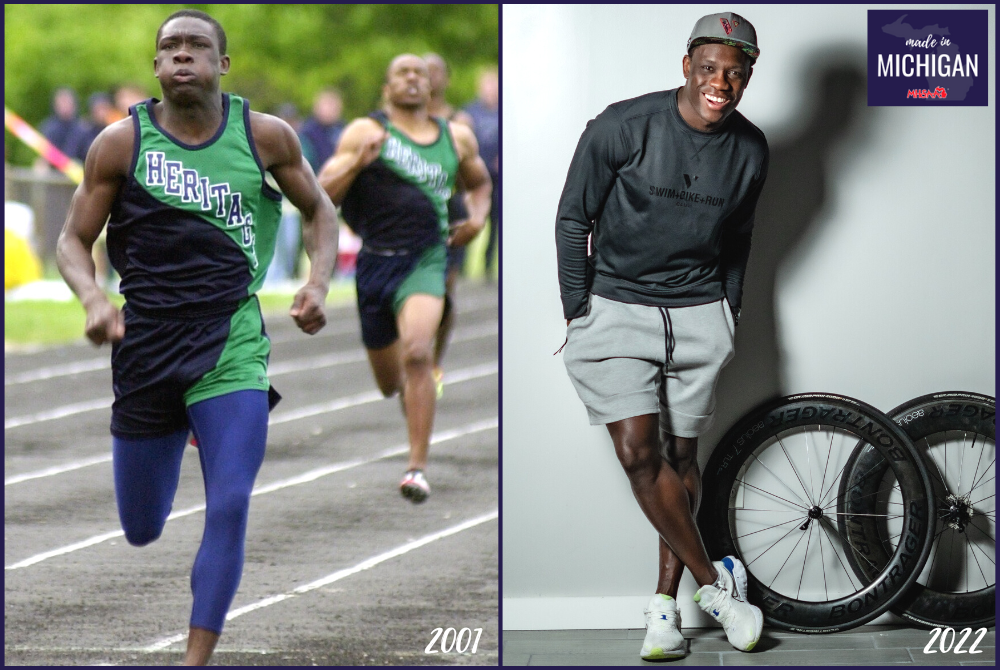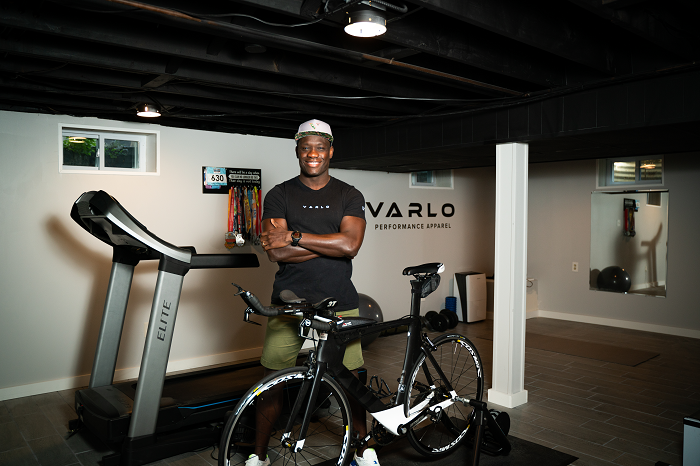
Ishpeming Adds to Near-Decade Reign Atop Upper Peninsula Division 2
By
John Vrancic
Special for MHSAA.com
June 5, 2022
KINGSFORD — The Ishpeming boys have allowed very little to stand between them and the Upper Peninsula Division 2 track & field championship in recent years.
They added another trophy to their collection Saturday by scoring 116 points.
The Hematites, who won three of the last four titles outright and shared the fourth, were followed by Iron Mountain with 102 points and St. Ignace at 63.
Senior Jonny Matson scored 36 points for the Hematites, who also have either won or tied for the title six of the last seven seasons.
That string was interrupted only in 2017 when they were runners-up to Newberry and three years later by COVID-19.
Last year, the Hematites shared the title with Norway.
Matson won the 400-meter dash in 53.58 seconds and long jump at 18 feet, 11¾ inches and was runner-up in the 100 (11.73) and 200 (23.77).
“Jon has been a great leader for us, and Parker Gauthier and Hunter Smith picked it up,” said Troy Smith, who shares Ishpeming’s coaching duties with his wife Trisha. “We greatly appreciate the effort of our coaching staff (Morgan Kangas, Khora Swanson and Hailey Smith). They’re a big part of our success.
“Our numbers have been a little low, but we have a great group of kids.”
 The Hematites won the 3,200-meter relay in 9 minutes, 4.42 seconds, and Tramon Gauthier added a first in the 110 hurdles (16.67) and second in the 300s (43.0).
The Hematites won the 3,200-meter relay in 9 minutes, 4.42 seconds, and Tramon Gauthier added a first in the 110 hurdles (16.67) and second in the 300s (43.0).
Smith was runner-up in high jump (5-11), and Parker Gauthier placed third in the 3,200 (11:44.6).
Iron Mountain’s Matt Colavechhi won the 100 (11.56) and 200 (23.71), and senior Luke Ruble added victories in the 1,600 (4:54.69) and 3,200 (10:52.05).
The Mountaineers also won the 400 relay (45.31) and 800 (1:34.42).
Bark River-Harris was runner-up in the 400 in a school-record 45.34
“Nick (Anderson) started real good and got us in a good spot,” said BR-H junior Vincent Martin, who ran the second leg. “We were seeded fourth. We knew the other three teams were good in the first and anchor legs. We mixed up our lineup a little and were in first going into the third leg.”
St. Ignace got a first from junior Reese McLean in the 800 (2:09.06), and Owen Lester took pole vault (10-0).
“That was a PR by three seconds,” said McLean. ‘With this being the last meet, I decided I might as well put everything into it. I think I started out all right. I wanted to get to the front right away.”
West Iron County’s Landon Sundelius won the 300 hurdles (40.56) and placed second in the 110s (16.74), and Nathan Hochstein of L’Anse was high jump champion at 5-11.
Manistique earned a victory in the 1,600 relay (3:43.99).
PHOTOS (Top) Ishpeming's Tramon Gauthier leads West Iron County's Landon Sundelius and they take first and second in the 110 hurdles. (Middle) Iron Mountain's Matthew Colavecchi edges Bark River-Harris's Vincent Martin by three hundredths of a second to seal the win in the 400 relay. Other members of Iron Mountain's winning relay were Max Jayne, Joey Colavecchi, and Kurt Adiano Ryan. (Click for more from Cara Kamps/Run Michigan.)

Lessons Learned on Track Have Jibowu's Business Surging to Quick Success
By
Paul Costanzo
Special for MHSAA.com
August 1, 2022
Athletics showed Soj Jibowu just how far he could push himself.
All the time spent on the track, working to become the state’s best high school 400-meter runner, and then more than that, taught him to stretch beyond what he thought were his limits.
So, when it came time to make a decision on whether to jump fully into his apparel company, Varlo, or keep it as a part-time side venture, the 2001 Saginaw Heritage graduate knew he could take himself to another level if needed.
Jibowu is the founder and CEO of Varlo, a clothing company that specializes in outfitting triathletes, but also offers casual wear for men and women. The company is just over three years old, but its clientele includes hundreds of triathletes, eight professionals, three NCAA programs and even hospitals. Merchandise is sold in eight countries.
All of that is validation for Jibowu, who took the leap to pursuing the company full-time just one year into its existence.
“When I resigned (from a medical sales job) to do this full-time, my wife was pregnant with our second child, my daughter wasn’t even walking yet,” said Jibowu, who now lives in Cherry Hill, N.J., with his wife and two young children. “Where was my state of mind to leave my very comfortable, high-paying job to pursue this – to sell clothes?”
His mind was in the same place that helped him reach tremendous heights as a runner, both at Heritage and Central Michigan University.
Jibowu, who was born in Nigeria and spent much of his childhood in Huntsville, Ala., was part of some incredible Heritage teams. He graduated a year behind eventual NFL safety Stuart Schweigert, who he ran with on the Finals-winning 1,600 relay in 2000. Another member of that relay was Derold Sligh, who won the 400-meter Finals title that year, setting the Lower Peninsula Division 1 Finals record in the process. The Hawks were LP Division 1 runners-up as a team that season.
“I ran track when I was younger, and I was terrible,” Jibowu said. “In high school, if I look back at it, I probably would have called it impostor syndrome. I think that was me up until maybe like somewhere in my senior year when I started to think, ‘I’m pretty fast.’ … I had so many dominant people around me, in my mind, I was still the slow guy.”
 As a senior, Jibowu erased that self-doubt. He led Heritage to its first, and still only, Division 1 Finals title, running the 400 in 48.28 and breaking the record Sligh had set the year prior.
As a senior, Jibowu erased that self-doubt. He led Heritage to its first, and still only, Division 1 Finals title, running the 400 in 48.28 and breaking the record Sligh had set the year prior.
It was working to get to that point that Jibowu still credits with his ability to push himself in all things.
“I preach this all the time: if you have the ability to be involved in sports at a young age, do it,” Jibowu said. “It’s a gift, first of all. You don’t know any better when you’re young, you think you’re just training your body, but what’s really, truly occurring is you’re training your mind and building discipline. You’re building your character as far as who you are as a person. What is your will? How far are you willing to push? Am I able to be coached? Am I able to learn? Am I able to lose over and over again and keep going? Am I able to navigate to feel what it’s like to win? What you’re truly developing is how to manage and handle life.”
Jibowu said he didn’t finalize his college decision until late in the process, as he had to work on his test scores into the summer. While at CMU, he majored in biomedical science and chemistry, and he excelled, admitting he was a much better student in college than in high school.
He was also reunited with Sligh on the Chippewas track team, and had a successful career. He was regularly within the top five in the 200 and 400 in the Mid-American Conference, and won a MAC title in the 400 at the 2004 indoor championships. His personal bests in the races were 21.19 and 46.81, respectively.
After graduating from CMU, Jibowu began working as a pharmaceutical rep, then moved into medical sales.
While he remained active, it wasn’t until he took a trip to Chicago that he discovered triathlons.
“I remember seeing these really cool bikes and these really fit people, and then they jumped into Lake Michigan,” he said. “And I didn’t know that was possible, because I didn’t grow up swimming. I didn’t know that volume of people knew how to swim like that. Then they get out of Lake Michigan, jump on their bikes and they’re flying. Then they’re sprinting a 6K and I remember thinking, ‘Oh my God, these guys are the real freaking deal.’ I was hooked and wanted to start competing.”
As he began competing, the wheels for his current venture began turning. At this point, Jibowu was living out east and had worked for a pair of successful start-ups in the medical industry. That helped give him knowledge, and confidence, to make his own moves.
“I had always been into clothes and fashion, and how you express yourself with what you wear,” Jibowu said. “There was an opportunity there. The sport of triathlon is as old as me; it started in (1983). That’s a baby. That’s like basketball without the 3-point line. There’s so much opportunity for innovation.”
With that, Varlo was born, and it has since thrived, with Jibowu and the lessons he learned on a track in Saginaw paving the way.
“If you are in high school and have the ability to be in a sport, it’s a gift,” he said. “At that young of an age, truly learning to manage the trials and tribulations of life. That is a gift.”
2021-22 Made in Michigan
July 28: Running Set Life's Stage for Grosse Pointe South's Record-Setting Meier Sisters - Read
July 25: 2005 Miss Basketball DeHaan Cherishing Newest Title: 1st-Time Mom - Read
July 21: Championship Memories Still Resonate with St. Thomas Star Lillard - Read
July 14: Portage Central Champ Rolls to Vanderbilt, Writing Next Chapter in Alabama - Read
July 12: Coaching Couple Passing On Knowledge, Providing Opportunities for Frankfort Wrestlers - Read
June 30: Hrynewich's Star Continuing to Rise with Olympic, Pro Sports Arrivals - Read
PHOTOS (Top) At left, Heritage’s Soj Jibowu wins the 400 meters during the 2001 Saginaw Valley League championship meet. At right, Jibowu is the founder and CEO of the Varlo clothing company. (Middle) Jibowu’s company specializes in outfitting triathletes, and he has taken up the sport after a successful college track & field career. (Heritage photo courtesy of Saginaw News/MLive; current photos courtesy of Soj Jibowu.)

